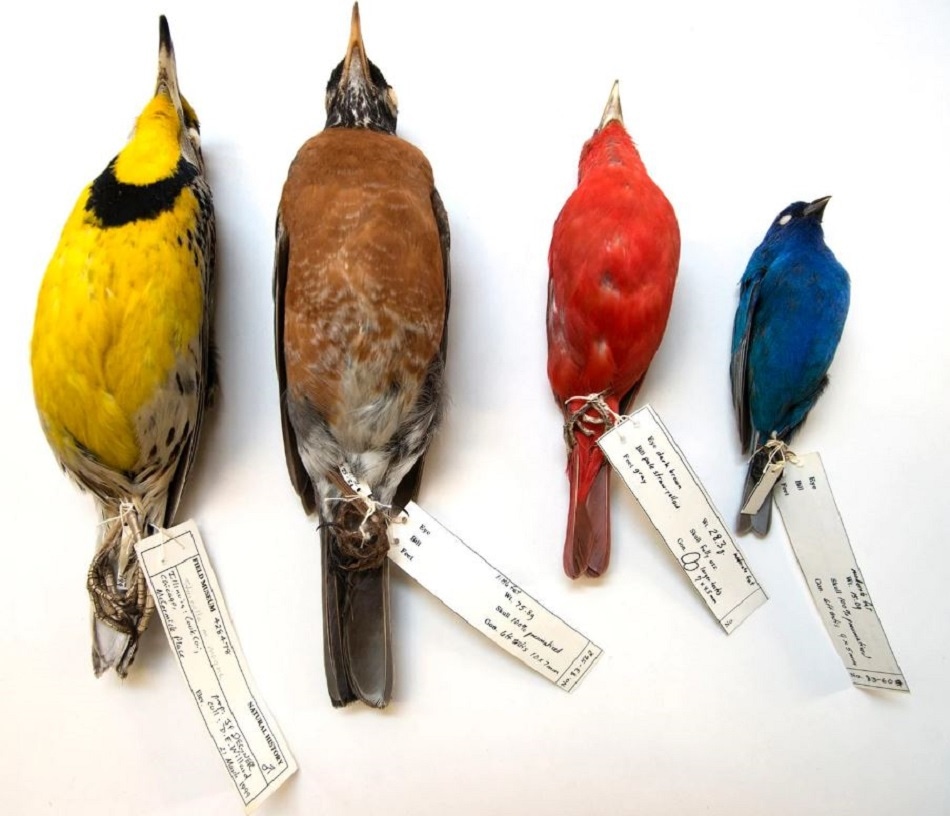
Image Credit: Karen Bean/ Field Museum
Researchers at The Field Museum for Natural History, Chicago and the University of Michigan have revealed that birds are seemingly getting smaller while their wingspan is growing as a result of climate change.
The specimens analyzed were of those that had collided into buildings and skyscrapers in Chicago while migrating from Canada to Latin America. David Willard, an ornithologist at The Field Museum, heads out each morning during the spring and fall to collect dead birds.
I've just stopped for the season. The number of birds we get each day is highly variable depending on whether it's a big day of migration. The maximum is 300 in a day.
David Willard, Ornithologist, The Field Museum
Since 1978 Willard and a group of volunteers have been collecting the dead birds amassing over 100,000 specimens. For this study in particular, the researchers examined 70,716 of 52 collected species of North American migratory birds. The largest investigation of its kind, the team carefully analyzed data from the birds that were measured using calipers and scales by Willard who recorded all of his data by hand.
Willard, who also co-authored the paper, used methods described as “the gold standard” for this kind of study, according to lead author Brian Weeks, an assistant professor at the school for environment and sustainability at the University of Michigan.
We found almost all of the species were getting smaller. The species were pretty diverse, but responding in a similar way. The consistency was shocking.
Brian Weeks, Assistant Professor, The School for Environment and Sustainability, the University of Michigan
Published in the journal Ecology Letters, the team outline how increases in temperature associated with climate change are predicted to cause reductions in body size across a range of animal species with the data from the birds being a key demonstrator of this trend. “We had good reason to expect that increasing temperatures would lead to reductions in body size, based on previous studies,” said Weeks. While Willard stated that he did not start collecting the dead bird specimens with climate change in mind but rather that he was gathering data as he was, “curious about seasonal trends.”
While most studies that consider animal response to climate change tend to be concentrated on factors associated with geographical range, migration, and population this study proposes that body morphology should also be considered a crucial element. The study concluded that between 1978 and 2016, the lower leg bone shortened by around 2.4% while the wingspan increased by about 1.3% with evidence pointing toward the warming temperatures as a key cause for this phenomenon.
Therefore, in order to better understand the effects of climate change on animal species and how they will adapt to survive, Weeks argues that body morphology must be taken into account along with geographical range and life events. “That's one major implication,” Weeks said. “It's hard to understand how species will adapt without taking all three of these things into consideration.”
In fact, the smaller body size could also have a significant impact on migratory patterns as smaller bodies produce less energy capable of completing long journeys. "Migration is an incredibly taxing thing,” Weeks said. The birds with longer wingspans were most likely to survive the long journey as they showed signs of adapting. Benjamin Winger, study co-author and graduate student at the University of Michigan added, “Birds with longer and more pointed wings might be more efficient fliers.”
The next step for the researchers is to use the data collected by Willard to determine whether the mechanism behind the body size and shape changes is the result of an animal’s ability to transform or mutate its development in response to a changing environment - a process known as developmental plasticity. This could lead to new and illuminating awareness concerning the morphological consequences of global warming in animal species. "When we began collecting the data analyzed in this study, we were addressing a few simple questions about year-to-year and season-to-season variations in birds," said Willard. "The phrase ‘climate change’ as a modern phenomenon was barely on the horizon."
Disclaimer: The views expressed here are those of the author expressed in their private capacity and do not necessarily represent the views of AZoM.com Limited T/A AZoNetwork the owner and operator of this website. This disclaimer forms part of the Terms and conditions of use of this website.